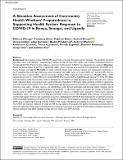| dc.contributor.author | Chengo, Rehema | |
| dc.contributor.author | Esho, Tammary | |
| dc.contributor.author | Kuria, Shiphrah | |
| dc.contributor.author | Kimani, Samuel | |
| dc.contributor.author | Indalo, Dorcas | |
| dc.contributor.author | Kamanzi, Lilian | |
| dc.contributor.author | Mouhamed, Bachir | |
| dc.contributor.author | Wabwire, Andrew | |
| dc.contributor.author | Camara, Khaltoume | |
| dc.contributor.author | Kapsandui, Tonny | |
| dc.contributor.author | Kagurusi, Patrick | |
| dc.contributor.author | Nankanja, Maureen | |
| dc.contributor.author | Oele, George | |
| dc.contributor.author | Osur, Joachim | |
| dc.date.accessioned | 2022-04-08T15:42:54Z | |
| dc.date.available | 2022-04-08T15:42:54Z | |
| dc.date.issued | 2022-03-31 | |
| dc.identifier.citation | Chengo R, Esho T, Kuria S, Kimani S, Indalo D, Kamanzi L, Mouhamed B, Wabwire A, Camara K, Kapsandui T, Kagurusi P, Nankanja M, Oele G, Osur J. A Situation Assessment of Community Health Workers' Preparedness in Supporting Health System Response to COVID-19 in Kenya, Senegal, and Uganda. J Prim Care Community Health. 2022 Jan-Dec;13:21501319211073415. doi: 10.1177/21501319211073415. PMID: 35356847; PMCID: PMC8977686. | en_US |
| dc.identifier.other | doi: 10.1177/21501319211073415. | |
| dc.identifier.other | PMID: 35356847 | |
| dc.identifier.other | PMCID: PMC8977686 | |
| dc.identifier.uri | https://repository.amref.ac.ke/handle/123456789/646 | |
| dc.description | https://creativecommons.org/licenses/by-nc/4.0/This article is distributed under the terms of the Creative Commons Attribution-NonCommercial 4.0 License (https://creativecommons.org/licenses/by-nc/4.0/) which permits non-commercial use, reproduction and distribution of the work without further permission provided the original work is attributed as specified on the SAGE and Open Access pages (https://us.sagepub.com/en-us/nam/open-access-at-sage). | en_US |
| dc.description.abstract | Background:
Coronavirus disease (COVID-19) caused socio-economic disruptions across the globe. The pandemic disrupted the health system (HS) calling for reengineering in response to high infection rates, deaths, and resultant containment measures. To deal with COVID-19 and promote resilience, community health workers (CHWs) were engaged across countries.
Objective:
Assess the preparedness of CHWs in supporting health system response in prevention and management of COVID-19 in Kenya, Senegal, and Uganda.
Methods:
A mixed methods design study involving national and subnational jurisdictions in the 3 countries. Key informant interviews were conducted with policy actors (16) and health care workers (24) while in-depth interviews involved CHWs (14) and community members (312) subjected to survey interviews.
Results:
Most (>50%) households survived on <USD 100/month during COVID-19 announced in March 2020 through national TV (57%), FM (42%), and radio station (27%). Community members interactions with CHWs increased during the pandemic through home visits as health educators, basic counseling providers and distributors of pandemic information tools, personal protective equipments, and social support commodities. The CHWs faced challenges during pandemic prevention and management including lack of: protective gear, salary, refresher courses, and identification tools; limited supervision and training; hostile reception during home visits; misconception and politicking about the pandemic. To effectively support prevention and manage of COVID-19, priority needs for CHWs were identified namely: provision of resources, protective gear, transport reimbursement, stipends, identification cards, and tools for recording and reporting; empowerment with adequate skills, trainings on provision of psychosocial support, first aid, and sensitization on policies.
Conclusion:
COVID-19 linked disruptions to optimal functioning of HS necessitated engagement of CHWs in the pandemic prevention and management. Findings underscore the important role CHWs play in supporting HS during crisis like COVID-19 to mitigate disruptions and stabilize the system for effective response. The CHWs can improve resilience of social and HS during unplanned disruptions for optimal functioning and attainment of universal health care. Policy makers should develop structured mechanisms for engaging CHWs while committing resources to address challenges that affect seamless synergy between health and CHWs Systems. | en_US |
| dc.description.sponsorship | Amref Corporate funds for the Rapid Results Initiative as well as the Amref End FGM/C Centre of Excellence funding from Peoples post Code Lotteries of United Kingdom (UK) and Netherlands (NL) through Amref UK and NL offices | en_US |
| dc.language.iso | en | en_US |
| dc.publisher | SAGE | en_US |
| dc.subject | COVID 19 | en_US |
| dc.subject | Kenya | en_US |
| dc.subject | Senegal | en_US |
| dc.subject | Uganda | en_US |
| dc.subject | Challenges | en_US |
| dc.subject | Community health workers | en_US |
| dc.subject | Functions | en_US |
| dc.subject | Priority needs | en_US |
| dc.title | A Situation Assessment of Community Health Workers' Preparedness in Supporting Health System Response to COVID-19 in Kenya, Senegal, and Uganda | en_US |
| dc.type | Article, Journal | en_US |

